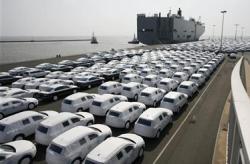 | « Back to article | Print this article |
With demand for petrol vehicles on the wane in the domestic market, automakers have stepped up efforts to boost exports of petrol engines and cars driven by the fuel to build volumes and offset the adverse impact of foreign exchange fluctuations. While Maruti Suzuki India, the country's largest passenger car maker, is exporting its 1-litre K-series engine to Hungary (which powers its small cars such as the Alto K10, A-Star, WagonR and Zen Estilo), to strap on to the Suzuki Splash (Ritz), Ford India is shipping out as much as 40 per cent of the engines produced at its Chennai facility to countries in southern Africa and Asia.
While Maruti Suzuki India, the country's largest passenger car maker, is exporting its 1-litre K-series engine to Hungary (which powers its small cars such as the Alto K10, A-Star, WagonR and Zen Estilo), to strap on to the Suzuki Splash (Ritz), Ford India is shipping out as much as 40 per cent of the engines produced at its Chennai facility to countries in southern Africa and Asia.
At Honda Cars India, exports of critical engine components for small car Brio are estimated to bring in revenues of Rs 471 crore (Rs 7.71 billion) this financial year.
Toyota Kirloskar Motor Pvt Ltd (TKM) is looking at closing the year with sales of 20,000 units of the petrol-driven versions of the Etios sedan and the Liva small car in Africa.
The renewed effort to boost exports of vehicles and components come at a time when a record inventory of around 155,000 units of petrol vehicles are lying in sales networks across companies. This accounts for 70 per cent of the stocks available in the market.
Diesel vehicle sales increased by 42 per cent between April and November this financial year. Petrol vehicle sales fell 20 per cent in the same period, and this, too, over a low base of petrol car sales in 2011.
Maruti Suzuki, for one, has an idle capacity for manufacturing 500,000 units of petrol engines. Compatriot TKM is utilising only 15 per cent of the total capacity of assembling 100,000 units of petrol engines at its unit in Bangalore for sales in the domestic market.
While Ford India did not share details of capacity utilisation at its engine manufacturing facility, the company indicated manufacturing operations had not achieved optimum levels and plans were being worked out to export engines to Europe.
"For every manufacturer, the aim is always to boost volumes by increasing sales both in the domestic and overseas markets. Besides, over the last two years, the (Japanese) yen has strengthened by 50 per cent, while the dollar has appreciated by nearly 20 per cent, which has raised substantially our import bills," said a senior executive at Maruti Suzuki, who did not want to be named.
"The natural hedge against